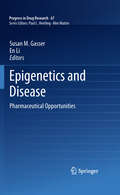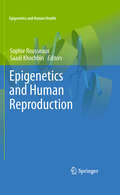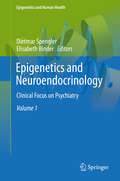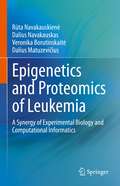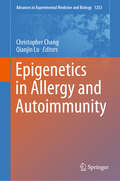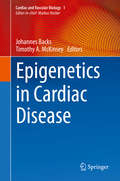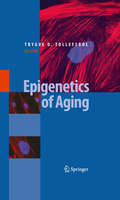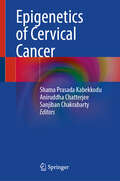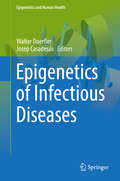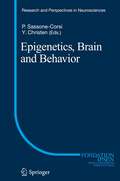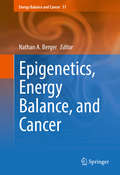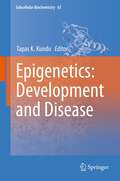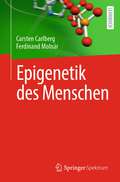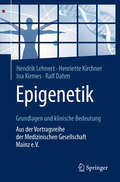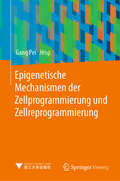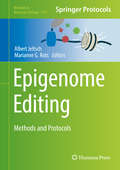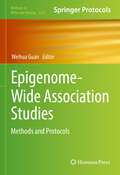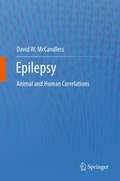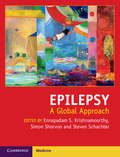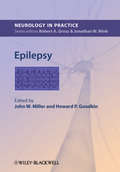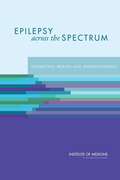- Table View
- List View
Epigenetics and Disease
by Susan M. Gasser En LiEpigenetics has emerged recently as an important area of molecular biological studies. Epigenetic modifications lead to potentially heritable but reversible alterations in the expression of genes that determine cell fate. Epigenetic misregulation is thus often linked to degenerative diseases, cancer and neuronal disorders. Recent biomedical interest in this regulatory system stems from the fact that epigenetic, in contrast to genetic, alterations are in principle amenable to pharmacological intervention. A few epigenetically active drugs, for example histone deacetylase inhibitors (HDACi) and DNA methyltransferase (DNMT) inhibitors, have been approved by FDA for treatment of cancers such as CTCL, MDS, and AML. This volume explores the scientific background for clinical applications of epigenetically active drugs. Included are descriptions of epigenetic controls over gene expression, the post-transcriptional silencing of genes by RNA interference (RNAi) and microRNAs, as well as new findings from stem cell research which are relevant to pharmacological applications.
Epigenetics and Human Reproduction
by Saadi Khochbin Sophie RousseauxEpigenetics is a rapidly expanding field in medical and biological research which concerns heritable traits that are not attributable to changes in the DNA sequence. Epigenetic mechanisms play key roles in many biological processes, and it has become clear that their disruption can gives rise to diverse pathologies in humans. Edited by preeminent experts, Sophie Rousseaux and Saadi Khochbin, this volume in the 'Epigenetics and Human Health' series discusses the role of epigenetics in human reproduction
Epigenetics and Neuroendocrinology
by Dietmar Spengler Elisabeth BinderThe field of neuroendocrinology has extended from the initial interest in the hypothalamic control of pituitary secretion to embrace multiple reciprocal interactions between the central nervous system (CNS) and endocrine systems in the coordination of homeostasis and various physiological responses from adaptation to disease. Most recently, epigenetic mechanisms were recognized for their role in the development of the neuroendocrine axes as well as in the mediation of gene-environment interactions in stress-related psychiatry disorders.
Epigenetics and Proteomics of Leukemia: A Synergy of Experimental Biology and Computational Informatics
by R¯uta Navakauskien˙e Dalius Navakauskas Veronika Borutinskait˙e Dalius Matuzevi˘ciusThis book reviews the current state of epigenetics and proteomics of leukemia and introduces the methods that are important to process and evaluate these factors in leukemia. In particular, epigenetic modifiers and their inhibitors in leukemia treatment as well as approaches to the epigenetic treatment of leukemia are covered. Various computational methods for proteome analysis are also described in detail, including 2DE fractionation and visualization, proteomic data processing, image acquisition and data anlaysis, and more. Protein localization in leukemia is also covered, in addition to the future of leukemia therapy. Epigenetics and Proteomics of Leukemia is an ideal book for advanced biomedical scientists and students, medical doctors and students, bioinformatics and health informatics researchers, computational biologists, structural biologists, systems biologists, and bioengineers.
Epigenetics in Allergy and Autoimmunity (Advances in Experimental Medicine and Biology #1253)
by Christopher Chang Qianjin LuThis book will address the growing roles of epigenetics in disease pathogenesis, and review the contribution of epigenetic modifications to disease onset and progression. The roles that epigenetics plays in facilitating effects of the environment on allergy and immunologic diseases will be reviewed. The book is divided into three parts – the first is an introduction to epigenetics and the methods that have been developed to study epigenetics, the second addresses epigenetics in allergic diseases and the third part will cover epigenetics in autoimmune diseases. With the rapid expansion of knowledge of how genes are regulated and how this regulation affects disease phenotypes, this book will be attractive to experienced researchers as well as those just launching an epigenetics research program. It will also be of interest to allergist, immunologists, rheumatologists and dermatologist who are engaged in clinical practice as a resource for understanding the basis for personalized and precision medicine. For example, the role that epigenetics plays in the pathogenesis in various allergic and autoimmune disorders and how this determines disease phenotypes will be covered extensively in this book. This book will thus help fill the gap in available resources on epigenetics in allergy and autoimmune diseases.
Epigenetics in Cancer (Life Science Research Fundamentals)
by WileyEpigenetics is the study of heritable changes in gene expression or cellular phenotype, caused by mechanisms other than changes in the DNA sequence. Examples include DNA methylation and histone modification. These changes may remain through cell divisions and multiple generations. Epigenetic differences among individuals may account for some of the differences between monozygotic (identical) twins. Aberrant DNA methylation is also frequently associated with human aging and diseases, such as cancer. This collection of overviews and laboratory protocols provides crucial, distilled information about the roles of epigenetics in cancer development. The overviews are geared for research scientists who need to learn more about the current understanding of epigenetic variation in humans and how the processes of DNA methylation and histone modification are regulated. The protocols give step-by-step instructions on how to detect DNA methylation using various methods such as MAPit, CHARM (arrays) and methylation-specific PCR. This e-book — a curated collection from eLS, WIREs, and Current Protocols — offers a fantastic introduction to the fields of genetics, genomics, and oncogenesis for students or interdisciplinary collaborators.
Epigenetics in Cardiac Disease
by Johannes Backs Timothy A. MckinseyThis book describes important advances in our understanding of how environmental conditions affect cardiac gene expression through epigenetic mechanisms. Further, it discusses the roles of chromatin modifications (in particular DNA methylation and histone modifications) and of chromatin regulators in the context of cardiac diseases. The book provides readers with an overview of our current understanding of epigenetic regulation in the heart, and will stimulate further research in this exciting field. Edited and written by internationally respected experts, it addresses the needs of professors, students and researchers working in the fields of cardiac biology and epigenetics.
Epigenetics in Cardiac Disease (Cardiac and Vascular Biology #1)
by Johannes Backs Timothy A. McKinseyThis book describes important advances in our understanding of how environmental conditions affect cardiac gene expression through epigenetic mechanisms. Further, it discusses the roles of chromatin modifications (in particular DNA methylation and histone modifications) and of chromatin regulators in the context of cardiac diseases. The book provides readers with an overview of our current understanding of epigenetic regulation in the heart, and will stimulate further research in this exciting field. Edited and written by internationally respected experts, it addresses the needs of professors, students and researchers working in the fields of cardiac biology and epigenetics.
Epigenetics in Oncology (Cancer Treatment and Research #190)
by Jun Lu Jianjun Chen G. Greg WangThis book addresses Epigenetics in Cancer and covers the most recent advances in RNA/histone/DNA epigenetics in Oncology. RNA/histone/DNA epigenetics have been shown to play pivotal roles in cancer initiation, progression, maintenance and drug response/resistance, tumor microenvironment, cancer stem cell self-renewal, cancer metabolism, and tumor immune evasion. In particular, research in RNA cancer epigenetics has made impressive progress in the last few years.Individual chapters in Part I (focusing on RNA epigenetics) are devoted to RNA modifications in Cancer Metabolism and Microenvironment, Cancer Stem Cell Biology, Immune Surveillance, Solid Tumors and Tumor Immunity, and Hematopoietic Malignancies, as well as to RNA editing in Cancer. Chapters in Part II and III of the book focus on histone epigenetics and DNA epigenetics, respectively.By familiarizing readers with the latest developments in this complex and challenging field, the book offers a valuable resource for scientists, graduate students and clinicians alike.
Epigenetics of Aging
by Trygve O. TollefsbolRecent studies have indicated that epigenetic processes may play a major role in both cellular and organismal aging. These epigenetic processes include not only DNA methylation and histone modifications, but also extend to many other epigenetic mediators such as the polycomb group proteins, chromosomal position effects, and noncoding RNA. The topics of this book range from fundamental changes in DNA methylation in aging to the most recent research on intervention into epigenetic modifications to modulate the aging process. The major topics of epigenetics and aging covered in this book are: 1) DNA methylation and histone modifications in aging; 2) Other epigenetic processes and aging; 3) Impact of epigenetics on aging; 4) Epigenetics of age-related diseases; 5) Epigenetic interventions and aging: and 6) Future directions in epigenetic aging research. The most studied of epigenetic processes, DNA methylation, has been associated with cellular aging and aging of organisms for many years. It is now apparent that both global and gene-specific alterations occur not only in DNA methylation during aging, but also in several histone alterations. Many epigenetic alterations can have an impact on aging processes such as stem cell aging, control of telomerase, modifications of telomeres, and epigenetic drift can impact the aging process as evident in the recent studies of aging monozygotic twins. Numerous age-related diseases are affected by epigenetic mechanisms. For example, recent studies have shown that DNA methylation is altered in Alzheimer's disease and autoimmunity. Other prevalent diseases that have been associated with age-related epigenetic changes include cancer and diabetes. Paternal age and epigenetic changes appear to have an effect on schizophrenia and epigenetic silencing has been associated with several of the progeroid syndromes of premature aging. Moreover, the impact of dietary or drug intervention into epigenetic processes as they affect normal aging or age-related diseases is becoming increasingly feasible.
Epigenetics of Cervical Cancer
by Shama Prasada Kabekkodu Aniruddha Chatterjee Sanjiban ChakrabartyThis book focuses on the fundamentals of epigenetics, covering the roles of DNA methylation, histone modifications, and non-coding RNA, especially miRNA and lncRNA, in cervical cancer. The chapters discuss various methods to detect epigenetic changes and how these changes could be useful for diagnosis, prognosis, as well as epigenetic therapy. Further chapters address the up-to-date approaches and solutions to the parameterizing bottlenecks associated with the translation of these findings for the management of cervical cancer. The book is supplemented with figures and tables to aid conceptual understanding. The book is relevant for researchers, academicians, scientists, as well as medical students seeking to understand the fundamentals of cervical cancer based on environmental or genetic factors.
Epigenetics of Infectious Diseases
by Walter Doerfler Josep CasadesúsThe present volume of Epigenetics and Human Health is devoted to the patho-epigenetics of viral and microbial infections, an exiting new field of disease-related epigenetic research. As recognized during the past years, epigenetic reprogramming of pathogen and host genome functions - the latter frequently induced by pathogens - plays an important role in many infectious processes. Beyond their immediate relevance for pathogen proliferation and obligatorily associated symptoms, such alterations frequently contribute to severe additional complications, such as the development of immunodeficiency, cancer and various chronic disorders. This holds in particular for epigenetic dysregulation of host gene expression induced by latent infections. The present book summarizes current knowledge of the mechanisms underlying epigenetic changes caused by viral, bacterial, fungal and protozoan infections and their impact on human health.
Epigenetics, Brain and Behavior
by Yves Christen Paolo Sassone CorsiRecent years have seen spectacular advances in the filed of epigenetics. These have attracted the interest of researchers in many fields and evidence connecting epigentic regulation to brain functions has been accumulationg. Neurons daily convert a variety of external stimuli into rapid or long-lasting changes in gene expression. A variety of studies have centered on the molcular mechanisms implicated in epigentic control and how these may operte in concert. It will be critical to unravel how specifity is achieved. The focus of this volume is on critical epigenetic regulation and chromatin remodeling events that occur in the nervous system and on the presumed mechanisms that operate within neurons to translate them into long-lasting neuronal responses.
Epigenetics, Energy Balance, and Cancer
by Nathan A. BergerThis volume of Energy Balance and Cancer provides state-of-the-art descriptions of the rapidly evolving science of epigenetics and how it may explain mechanisms by which alterations in energy balance such as obesity and physical activity may impact cancer. In addition to chapters explaining the processes mediating epigenetic regulation, the volume contains a series of chapters explaining how environmental influences including early life events, nutrition, exercise and microbiota may induce epigenetic changes that can affect carcinogenesis. The following chapters describe epigenetic relations of energy balance to cancer in distinct organ systems including esophagus, colon, prostate and breast. Epigenetics, Energy Balance and Cancer provides a valuable resource for students, research investigators and clinicians seeking to better understand these processes as well as a basis for novel translational and transdisciplinary approaches to further elucidate these processes and develop preventive and therapeutic strategies.
Epigenetics: Development and Disease
by Tapas Kumar KunduEpigenetics fine-tunes the life processes dictated by DNA sequences, but also kick-starts pathophysiological processes including diabetes, AIDS and cancer. This volume tracks the latest research on epigenetics, including work on new-generation therapeutics.
Epigenetik des Menschen
by Carsten Carlberg Ferdinand MolnárDie Ansicht „Es liegt alles in unseren Genen und wir können es nicht ändern“ hat sich in den letzten 150 Jahren seit Gregor Mendels Experimenten mit blühenden Erbsenpflanzen entwickelt. Es gibt jedoch eine besondere Form der Genetik, die Epigenetik, bei der unsere Gene nicht verändert werden, sondern geregelt wird, wie und wann sie genutzt werden. Unsere Umwelt und Lebensstilentscheidungen beeinflussen die Epigenetik unserer Zellen und Organe, d. h. die Epigenetik verändert sich dynamisch während unseres gesamten Lebens. Wir haben also die Möglichkeit, unsere Epigenetik sowohl positiv als auch negativ zu verändern.In diesem Buch wird auf molekularer Ebene erklärt, wie unser Genom mit Umweltsignalen verbunden ist. Es zeigt auf, dass die epigenetische Programmierung ein Lernprozess ist, der zu einem epigenetischen Gedächtnis in jeder Zelle unseres Körpers führt. Die zentrale Bedeutung der Epigenetik während der Embryogenese und der zellulären Differenzierung sowie beim Alterungsprozess und dem Risiko für die Entstehung von Krebs werden erörtert. Darüber hinaus wird die Rolle des Epigenoms als molekularer Speicher für zelluläre Ereignisse nicht nur im Gehirn, sondern auch in Stoffwechselorganen und im Immunsystem beschrieben.Das Buch ist die Übersetzung des Lehrbuchs „Human Epigenetics: How Science Works“ (ISBN 978-3-030-22907-8) der Autoren. In den ersten fünf Kapiteln werden die molekularen Grundlagen der Epigenetik erläutert, während die folgenden sieben Kapitel Beispiele für die Auswirkungen der Epigenetik auf die menschliche Gesundheit und Krankheit liefern.
Epigenetik – Grundlagen und klinische Bedeutung: Aus Der Vortragsreihe Der Medizinischen Gesellschaft Mainz E. V.
by Hendrik Lehnert Henriette Kirchner Ina Kirmes Ralf DahmDas vorliegende Buch gibt einen kurzen Überblick über die neuesten Erkenntnisse auf dem spannenden Gebiet der Epigenetik. Es wird erklärt, wie die Epigenetik das Schicksal von Zellen bestimmt, unserem Genom Komplexität verleiht und wie die Epigenetik Informationen der Umwelt für das Genom übersetzt.
Epigenetische Mechanismen der Zellprogrammierung und Zellreprogrammierung
by Gang PeiDieses Buch stellt ein umfangreiches Forschungsprogramm zu epigenetischen Mechanismen der Zellprogrammierung und Reprogrammierung vor. Das Programm wurde von der National Natural Science Foundation of China während des 11. Fünfjahresplans gestartet, der im Oktober 2008 begann und Ende 2016 abgeschlossen wurde. Es fasst zunächst die epigenetischen Forschungspläne und den aktuellen Stand der epigenetischen Forschung in China und im internationalen Vergleich zusammen. Unter Anwendung interdisziplinärer Forschungsmethoden erörtert das Buch die Entwicklungstrends der epigenetischen Forschung, wie die Mechanismen der Etablierung und Aufrechterhaltung epigenetischer Informationen und die epigenetische Regulierung von Reproduktion und Entwicklung. Außerdem wird eine Vielzahl von Forschungsergebnissen vorgestellt. So werden beispielsweise die Entdeckung neuer epigenetischer Regulatoren und Chromatin-Remodulatoren sowie deren biologische Funktionen und Mechanismen hervorgehoben. Es werden verschiedene Regulierungsmechanismen der Zelldifferenzierung und Transdifferenzierung erörtert, insbesondere die Entdeckung der Schlüsselfaktoren zur Förderung der Transdifferenzierung von Körperzellen zu Hepatozyten. Darüber hinaus werden in diesem Buch einige wichtige akademische Bereiche mit zunehmender Bedeutung vorgestellt, wie Biochemie, Zellbiologie und klinische Medizin. Aufgrund seines Umfangs ist das Buch für Forscher interessant, die in den Bereichen Zellbiologie, Biochemie, Strukturbiologie, Bioinformatik, klinische Medizin und anderen verwandten Gebieten arbeiten.
Epigenome Editing: Methods And Protocols (Methods In Molecular Biology #1767)
by Albert Jeltsch Marianne G. RotsThis detailed book explores the concepts and applications of epigenome editing, as presented by leading scientists in the field. Beginning with some general and topical reviews, the collection continues by covering the design of DNA-binding devices, optimization of the effector domains, readout of epigenome marks, and approaches for delivery at the cellular and organismal level. Written for the highly successful Methods in Molecular Biology series, chapters include introductions to their respective topics, lists of the necessary materials and reagents, step-by-step, readily reproducible laboratory protocols, and tips on troubleshooting and avoiding known pitfalls. Authoritative and practical, Epigenome Editing: Methods and Protocols will be of great assistance to people new to the field but also to those already engaged, as epigenetic editing is still a relatively unexplored field with many issues to be resolved.
Epigenome-Wide Association Studies: Methods and Protocols (Methods in Molecular Biology #2432)
by Weihua GuanThis volume details features of DNA methylation data, data processing pipelines, quality control measures, data normalization, and to discussions of statistical methods for data analysis, control of confounding and batch effects, and identification of differentially methylated regions. Chapters focus on microarray-based methylation measures and sequence-based measures. Written in the highly successful Methods in Molecular Biology series format, chapters include introductions to their respective topics, lists of the necessary methodologies and software packages, step-by-step, readily reproducible analysis pipelines, and tips on troubleshooting and avoiding known pitfalls. Authoritative and cutting-edge, Epigenome- Wide Association Studies: Methods and Protocols: aims to be a useful practical guide to researches to help further their study in this field.
Epilepsy
by David W. MccandlessThe present volume is intended to be a synopsis of seizure disorders with a goal of describing key studies in animals and humans. The translation of pertinent findings from animal studies to human studies, and to potential human studies will be emphasized. Specific cogent animal studies/results which deserve exploration in human seizure disorders will be detailed. The current rate of translation is estimated to be from 7-9 years, and the "success" rate of translation was very recently listed as less than one half. The success rate is defined as results in human studies which were predicted in advance by animal studies. Both the time between animal and human attempts plus the success rate need improvement.
Epilepsy
by Vivek Mishra Krishnamoorthy Ennapadam S. Shorvon Simon D. Schachter Steven C. Mishra Vivek Steven C.This title in the acclaimed Blue Books of Neurology series highlights advances in epileptology and new ways of managing seizure disorders. Contributors from around the world-most new to this volume-lend a global perspective and provide the latest thinking on the new and controversial issues surrounding epilepsy. You ll find detailed discussions of difficulties in diagnosing and treating epilepsy, including the latest pharmacologic management strategies. This book covers the entire range of issues in epilepsy from basic science research to current clinical issues to medical and surgical therapeutics. Find all you need on critical issues in treating epilepsy and seizure disorders. Provides the expertise of new contributors and volume editors who are world-class authorities in the field for authoritative guidance. Features thoroughly updated content including new chapters-Seizure Prediction; Drug Resistance Genes; Cortical Myoclonus and Epilepsy; Sudden Unexplained Death in Epilepsy; Seizures in the Elderly; Rasmussen s Encephalitis; Epilepsies Due to Monogenic Disorders of Metabolism; Epilepsy and Sleep; Long-term Effects of Seizures on Brain Structure and Function; Brain Stimulation in Epilepsy-for the most current information for use in the decision-making process. Includes coverage of the surgical management of epilepsy to help you determine when it s best to recommend surgery and for which patients. Emphasizes pharmacologic management of seizure patients that reflects advances in biotechnology and imaging. "
Epilepsy
by John W Miller Howard P. GoodkinEpilepsy is a complicated neurological condition with variable manifestations, numerous etiologies, and a diverse range of treatments. It is a chronic disease that, in many cases, can be controlled. However, treatment requires accurate clinical evaluation to allow intelligent treatment choices. Epilepsy has been designed to help clinicians develop these evaluation skills. Expert neurologists have distilled the evidence and combined their experience.
Epilepsy (The\experience Of Illness Ser.)
by Graham ScamblerIn examining the social and psychological aspects of epilepsy, the author takes not only the perspectives of individuals and their families, but also popular conceptions of the disorder. The result is an illuminating account of the social reality of epilepsy that demonstrates the distinctive contribution that the social sciences can play in understanding illness.
Epilepsy Across the Spectrum
by Committee on the Public Health Dimensions of the EpilepsiesAlthough epilepsy is one of the nation's most common neurological disorders, public understanding of it is limited. Many people do not know the causes of epilepsy or what they should do if they see someone having a seizure. Epilepsy is a complex spectrum of disorders that affects an estimated 2. 2 million Americans in a variety of ways, and is characterized by unpredictable seizures that differ in type, cause, and severity. Yet living with epilepsy is about much more than just seizures; the disorder is often defined in practical terms, such as challenges in school, uncertainties about social situations and employment, limitations on driving, and questions about independent living. The Institute of Medicine was asked to examine the public health dimensions of the epilepsies, focusing on public health surveillance and data collection; population and public health research; health policy, health care, and human services; and education for people with the disorder and their families, health care providers, and the public. In Epilepsy Across the Spectrum, the IOM makes recommendations ranging from the expansion of collaborative epilepsy surveillance efforts, to the coordination of public awareness efforts, to the engagement of people with epilepsy and their families in education, dissemination, and advocacy for improved care and services. Taking action across multiple dimensions will improve the lives of people with epilepsy and their families. The realistic, feasible, and action-oriented recommendations in this report can help enable short- and long-term improvements for people with epilepsy. For all epilepsy organizations and advocates, local, state, and federal agencies, researchers, health care professionals, people with epilepsy, as well as the public, Epilepsy Across the Spectrum is an essential resource.
